USC students showcase docuseries
On Wednesday, the Ronald Tutor Campus Center ballroom transformed to accommodate the Annenberg symposium, an event hosted by the USC Graduate School’s Office of the Vice Provost.
At the event, Annenberg graduate fellows showcased their innovative and cutting-edge communications research through different booths and presentations.
The event featured “Stacy,” an episode from the docuseries “Finding Home.” The episode follows a 27-year-old Salvadoran transgender asylum seeker as she struggles to navigate her first months in the United States.
Stacy Alejandro tells her story as the directors of the short documentary, Abraham Troen and Sam Shaib, conduct interviews and document her journey. Other notable members of the project include producers Xin Li and Marc Mounier, and editors Yongle Wang, Elisa Oh, Erick Del Aguila and Mengna Lei.
Meredith Drake Reitan, associate dean of the Graduate School, discussed the importance of the symposium, citing the collaboration that the event fosters, especially with productions such as this one.
“When incoming students begin [their programs] in the fall, they have a chance to meet and talk about ways they might collaborate,” Drake Reitan said. “The symposium is the final event of the year and serves as the culminating moment where students are able to show their work.”
Troen, a master’s of fine arts studying in cinematic arts, film and television production, said that when the creators of the documentary series came to work on the project, it wasn’t easy finding a subject who would perfectly fit the role the directors had envisioned.
“We met a lot of people and tried to explore who could open up, who was willing to share their stories and who could share their personal tale and not just focus on political topics,” Troen said.
Shaib, also a master’s of fine arts student studying cinematic arts, film and television production, said the crew faced challenges when filming. He said that because the documentary covered a controversial social and political conflict, it was sometimes difficult to depict the individual’s entire story.
“We want to personalize their stories and be able to tell their journeys because they hold important messages,” Shaib said. “And it’s not easy to get individuals to open up because of the controversy on these matters.”
Both Troen and Shaib saw the benefits of telling Alejandro’s story because it’s one that isn’t often told or heard. Alvaro Parro, master’s of fine arts studying cinematic arts, film and television production, emphasized the importance of documenting a story like Alejandro’s.
“There is a severe lack of awareness of the Latina trans community,” Parro said. “I wanted to work on a project that would raise more awareness of a marginalized community. I was compelled by Stacy’s charisma. To see her moving through Los Angeles and to see how she was able to bring so much meaning to her life so far from El Salvador was very courageous.”
Parro also discussed the difficulty of accurately depicting stories on the screen. According to Parro, it can be tricky to portray the story being told.
Shaib said the filmmakers have gained perspective through working on the project.
“Our challenges seem so trivial now,” Shaib said. “What we’ve had to go through is nothing in comparison to what they had to go through.”

